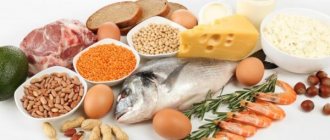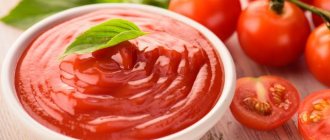Pregnancy is a special time for every woman. At this moment, a new life is born and developed in her body, already requiring care and attention. Of course, any mother wants the best for her baby, but any woman also wants to look good not only during this period, but also after the birth of the child. But, as you know, pregnant women are not recommended to go on diets, since the small body must receive all the substances necessary for its growth and formation through the mother. But there are some recommendations for women to eat at this moment in order to improve their well-being, have a positive effect on their body and the baby’s body, and also quickly get back into shape after childbirth.
The essence and general rules of the diet
The pregnancy period is divided into stages - trimesters. There are only three of them and each lasts three months. That is why the diet during pregnancy will also be divided into three stages, in each of which the diet will be adjusted, depending on those substances that will be especially useful for the growing body in a given period. Therefore, it may turn out that food that is very valuable in the first trimester can create problems for the child if consumed in the second trimester. The essence of the diet for pregnant women consists precisely in correcting the diet that is beneficial for mother and child at each stage of pregnancy, that is, by trimester.
Content:
- The essence and general rules of the diet
- Prohibited Products
- Diet in the first trimester
- Sample menu for 1st trimester
- Diet in the second trimester
- Diet in the third trimester
- Diet for excess weight
- Diet for edema
- Diet for constipation
- Morning sickness
- Heartburn during pregnancy
- Dietary recipes during pregnancy
- conclusions
Proper nutrition and hygiene are especially important during pregnancy. It is best to eat in small portions, but often. Since the growing belly puts pressure on the stomach and intestines and a large amount of food eaten can cause heartburn and heaviness in the stomach. It is better to eat your last meal about three hours before bedtime. One of the important rules is to compensate for the lack of vitamins, so throughout the entire period of pregnancy you need to take vitamin complexes prescribed by the gynecologist.
Prohibited Products
It is worth mentioning foods that are unacceptable for consumption during pregnancy. In principle, it is not recommended to eat all these foods in order not to gain weight, and in an interesting situation they are much more undesirable, since they can harm the health of not only expectant mothers, but also babies.
So, for all 9 months it is advisable to abstain from spicy and fatty, fried and salty foods. It is strictly not recommended to drink alcoholic beverages. It is also worth reconsidering your attitude towards exotic fruits, citrus fruits, strawberries and nuts. It is these products that often become allergy triggers. If you really want to eat an orange or strawberry, good for you. The main thing is not to overeat on them, so as not to develop a tendency towards allergies in your child.
Heartburn
Progesterone, actively synthesized by the body in the initial stages of pregnancy, tends to relax the smooth muscles of the gastrointestinal tract. The esophageal mucosa, where an alkaline environment is normally present, is also involved in this process. Weakening of the gastroesophageal sphincter can lead to the formation of gastroesophageal reflux and the development of heartburn.
To avoid this , adhere to the principle of fractional meals, try not to eat at night, give up spicy, fatty and salty foods. You can try changing your body position while sleeping by making your pillow higher. It is also possible to use various drugs to stabilize the acid-base balance.
Diet in the first trimester
The first trimester is very important for both mother and baby. It is during this period that the fetus begins to form and develop:
- the spine is formed;
- the heart and brain mature;
- the circulatory and nervous systems develop.
It is especially important during this period to arrange a woman’s nutrition so that the child receives all the substances necessary for full development. In the first trimester, it is better to use mainly protein foods, since protein is a building material for bones and cells. At this time, it is necessary to enrich the body with folic acid, which promotes the development of the baby’s nervous system and ensures timely cell division and growth. Also, to reduce the risk of fetal pathologies, it is necessary in the first trimester to increase the content in the body of such beneficial substances as zinc, iodine, selenium, cobalt and copper, as well as vitamins C and.
The following products will be useful during this period:
- various legumes;
- lean meats;
- eggs;
- vegetables;
- low-fat cottage cheese and cheese;
- liver;
- fresh juices;
- seaweed;
- whole grain bread.
It is recommended to give up fast food, carbonated sweet drinks, various canned foods, coffee, crackers, chips and hot sauces, and seasonings in the first trimester. It is best to give preference to vegetables and fruits that will be beneficial for both mother and child.
The mother’s feelings are especially strong in the second month of pregnancy. It is during this period that a woman gives most of the vitamins and nutrients contained in her body to the baby. Therefore, their deficiency should be replenished in a timely manner, and when the body asks for something, you should not refuse it. Hence the pronounced desire of a woman in the early stages to eat something extravagant or something non-standard.
Sample menu for 1st trimester
The menu for a week in the first trimester may look like this:
- Monday - you can eat low-fat yogurt and muesli for breakfast, you can eat meat soup for lunch, a vegetable salad or just vegetables is recommended for an afternoon snack, you can cook rice with vegetables for dinner, and drink a glass of milk at night.
- Tuesday - you can start the morning with milk porridge and a sandwich with butter and cheese, fish soup is good for lunch, eat about 100 grams of cottage cheese for an afternoon snack, eat pasta with liver at dinner, and at night you can eat some vegetables or seaweed salad.
- Wednesday - about 150 grams of cottage cheese and green tea with cookies are recommended for breakfast, for lunch you can eat vegetable soup or puree soup, for an afternoon snack you can enjoy fruit, and for dinner you can eat a steamed chicken cutlet and mashed potatoes; before bed, low-fat yogurt will be enough.
- Thursday - in the morning you can eat buckwheat porridge with milk, yogurt and drink a glass of juice, for lunch prepare vegetable soup with a slice of bread, replace the afternoon snack with fruit or fruit salad, for dinner eat a vegetable salad and baked fish, before going to bed you can drink a glass of cranberry juice or juice .
- Friday - for breakfast, prepare bread with cheese and tomatoes, an orange and a glass of fermented baked milk or kefir, for lunch, eat pasta with meatballs and a vegetable salad, fortify yourself with a small amount of walnuts in the afternoon, and dinner can consist of potatoes baked in sour cream and herbal tea, You can end the day with a glass of fermented milk product.
- Saturday - you can start the morning with cheesecakes and herbal tea, you can also add a little dried apricots here, for lunch we recommend chicken soup and a slice of whole grain bread, for an afternoon snack you can grate a carrot with an apple, and for dinner you can eat a salad with cheese, tomatoes and herbs, before bed drink a glass of milk.
- Sunday - for breakfast, prepare oatmeal with milk and fruit and drink a glass of juice, for lunch, eat chicken soup, vegetable salad and green tea, for an afternoon snack, any fruit is allowed, and for dinner, a chicken cutlet and steamed vegetables, before bed you can eat low-fat yogurt.
This is an approximate daily menu that you can follow when creating your own diet. The main thing is to try to adhere to basic nutritional rules and follow the doctor’s recommendations.
Diet in the second trimester
During this period, the development of the vital organs of the fetus, formed in the first trimester, is in full swing:
- brain mass increases;
- the respiratory system develops;
- the skeleton and skeletal system are formed.
In the second trimester, you should pay attention to foods containing calcium and vitamin D, which are necessary to strengthen bones and properly form the skeleton. And also at this time, food rich in iron is necessary, since at this time the placenta and the baby’s circulatory system are formed. It is especially important to understand what food you can eat during this period. Here is a sample list of recommended products.
- raisin;
- spinach;
- egg yolk;
- fish, especially liver;
- dairy products;
- vegetable fats.
Foods that need to be excluded from the diet in the second trimester:
- spicy and smoked foods;
- fatty and fried foods;
- smoked meats and sausages;
- sweet and flour dishes.
During this period, you should control the amount of fluid entering the body, as well as the consumption of carbohydrates. Since their excessive absorption can cause unwanted weight gain. Walking in the fresh air will be very useful for the expectant mother in this trimester, especially since the baby needs oxygen right now.
An approximate menu at this stage may include the consumption of cereals, cottage cheese, vegetables, rye flour products, potatoes, meat dishes, eggs, low-fat cheeses, and dairy products.
It is very good to eat carrots at this time, as it will help saturate the body with vitamin A, and if you pour it with vegetable oil, you can also get useful vitamin E.
Sample menu for every day in the 2nd trimester:
- breakfast - omelet;
- second breakfast - low-fat yogurt;
- lunch - chicken, meat or fish soup;
- afternoon snack - any fruit;
- dinner - milk porridge or vegetable stew with meat;
- before bed - some fruit, vegetable salad or a glass of fermented milk drink.
The principle of losing weight
To reduce the level of adipose tissue in the body, it is necessary to reduce (or at least not increase) the level of energy intake. The average female metabolism is about 1500 kcal per day, but can range from 1200 to 1900 kcal per day. To accurately measure this parameter, it is better to use studies such as bioimpedansometry or a gas analyzer method for measuring metabolism. It is known that for a noticeable breakdown of adipose tissue (at least 100 grams per day), it is necessary to create a difference between consumed and expended energy of at least 500-700 kcal. How to achieve the desired result of increasing the amount of nutrients while decreasing the amount of incoming energy?
Perhaps the best option is to practice keeping a food diary with daily calorie counting in order to make sure of its required level. At the same time, we remind you that this same level can be accurately calculated only after performing bioimpedance measurements or gas analyzer measurements of basal metabolism. In parallel with calorie counting, it would be correct to track the amount of key foods for each trimester in a food diary, as indicated above. Vegetable salads, fruits, lean meat and fish, seafood with a small amount of bread or potatoes can be an excellent diet for an expectant mother.
Another beneficial dish with this diet would be regular soup. Due to their beneficial composition and large amount of water, soups are low-calorie dishes; they are well suited for an individual menu for anyone who is watching their weight, including pregnant women.
One of the nutritional problems for pregnant women can be taste perversion, or PicaChlorotica. This is a condition when a woman’s taste sensations and preferences change, as a result of which the previously familiar diet can become tasteless and even cause nausea and disgust. This situation can create real problems when forming a diet, since it not only removes from a woman’s diet some of the products necessary for a balanced diet (for example, meat), but can also lead to a craving for relatively edible or generally inedible products, such as chalk, pencil leads or chicken shell. By the middle of the 3rd trimester, this situation usually ends.
Diet in the third trimester
In the third trimester, many women stop controlling their weight, believing that there is just a little left and now it doesn’t matter how many kilograms you gain in the remaining time. But this is far from true.
During this period, it is recommended to consume a lot of carbohydrates, as they are a source of glycogen and accumulate it in the muscles, placenta and uterine musculature. But this does not mean that you need to absorb them uncontrollably. You also need to monitor the amount of carbohydrates you eat, since gaining excess weight in the third trimester can lead to unnecessary consequences. Not only can this result in a difficult and protracted labor, it can also threaten the lives of mother and baby.
In the last months of pregnancy, it is time to take care of excess weight and reduce, as far as possible, the calorie content of food consumed. It is best to eat in very small portions, but 6-7 times a day.
At this stage, you should pay attention to the following dishes:
- lean fish;
- nuts and fruits;
- vegetable soups;
- fresh vegetables;
- boiled or steamed meat.
You should not use in the third trimester:
- fatty meats and fish;
- various fats, you can only use butter and vegetable oil;
- saturated fatty broths;
- pickles;
- fried foods.
It is better to eat fish and meat dishes in the first half of the day, so the proteins are better absorbed by the body. It is better to enrich the second half of the day with dairy products and vegetables.
Sample menu for the day in the third trimester:
- breakfast - tea and sandwich with butter;
- second breakfast - egg and seaweed salad;
- lunch - light fish soup;
- afternoon snack - low-fat cottage cheese;
- dinner - mashed potatoes with lean meat or fish;
- before bed - fruit salad or juice.
Principles of nutrition
To lose weight, a pregnant woman needs to follow simple food intake rules, as well as a hypoallergenic diet. If there is a sharp increase in body weight, the doctor will recommend fasting days.
Nutrition rules
Dietary dishes should be prepared only from fresh and always natural ingredients. It is important for a pregnant woman to follow certain rules during the diet:
- You can't overeat . After eating, a woman should not experience heaviness in her stomach. It is forbidden to skip meals. If you feel hungry, you are allowed to have a light snack with an apple or natural yogurt.
- Don't put off breakfast . After waking up, you can't take a break. Porridges that are ideal are: buckwheat, corn, oatmeal. They are rich in vitamins and microelements.
- In the first half of the day, doctors recommend that pregnant women eat protein foods, after lunch and in the evening – fermented milk, vegetable and dairy products.
- To avoid swelling, you need to drink a lot of water . To do this, cook jelly, compotes, fruit drinks, as well as brew weak tea and prepare a rosehip decoction.
- The expectant mother is obliged to eat properly . Therefore, the menu should be varied. All natural products are healthy and benefit the child. If you regularly consume only a certain set of foodstuffs, your body will have an excess of some nutrients and a deficiency of others.
- Sugar should be replaced with honey, and sweets with dried fruits, nuts, fresh berries and fruits.
- The best food is steamed, baked, boiled and stewed.
Advice! If you eat flour products and baked goods excessively, fermentation will occur in the intestines, which will lead to unpleasant sensations and cause discomfort.
Authorized Products
There is no need to starve to lose weight. It is enough for a pregnant woman to eat fractionally the right foods. Be sure to include in your diet:
- sour cream, cottage cheese, milk. They supply the body with iron and calcium, which help strengthen the child’s skeletal system. The folic acid contained in the composition will help the fetal nervous system develop correctly;
- porridge;
- meat dishes and those prepared from offal are the basis of protein nutrition;
- vegetables. Broccoli, carrots and spinach are especially beneficial;
- sea fish and seafood. These are sources of vitamin D, magnesium, phosphorus, iodine, protein and zinc;
- kefir;
- fruits. It is worth including avocados in the diet of pregnant women;
- oil;
- egg;
- nuts are a source of phytic acid, selenium, Omega-3, magnesium.
Prohibited Products
During pregnancy, especially at the end of the second and third trimester, it is necessary to exclude several food groups:
- that contain empty calories are baked goods, chips and soda;
- salty, spicy, smoked dishes, which cause severe toxicosis;
- products that can cause allergic reactions: tomatoes, strawberries, citrus fruits, chocolate, cocoa, shrimp. You don’t have to completely abandon them, but the volume must be reduced to a minimum;
- canned food, sausages, fish delicacies;
- If a woman is prone to obesity, then you should not eat foods that cause appetite - onions, rich broth and garlic.
In addition to the above, it is worthwhile for a pregnant woman to reduce the amount of fat she consumes, giving preference to vegetable fats. Adding to dishes should be kept to a minimum:
- lard;
- interior fat;
- spread and margarine.
In this case, the butter should be left, as it contains a large amount of substances beneficial for the pregnant woman.
If a woman is prone to obesity, then foods containing “light” carbohydrates should be excluded from the diet as much as possible. These include baked goods, candies, cookies, jam, and other treats that contain large amounts of sugar.
Diet for excess weight
Excess weight during pregnancy always threatens with unpleasant consequences for both mother and fetus. It can cause high blood pressure in pregnant women, which can cause weak labor and hypoxia in the child. And large fetuses most often occur in women who are overweight. The presence of extra pounds can lead to late toxicosis, which is much more dangerous than toxicosis in the early stages: swelling increases, increased blood pressure is often observed, and poor urine analysis.
In such cases, the doctor may recommend fasting days. They can be done about twice a week. They involve the use of kefir, apples, and cottage cheese. But at the same time, you should be aware that if you are prone to edema, it is better not to use fruit or vegetable fasting days. Since vegetables and fruits contain a large amount of liquid, and instead of losing weight, you can get the completely opposite effect.
Sample kefir diet menu:
- breakfast - oatmeal with green tea and whole grain bread with cheese;
- second breakfast - low-fat yogurt;
- lunch - vegetable soup, boiled chicken, stew and a glass of tea;
- afternoon snack - kefir;
- dinner - low-fat cottage cheese, a third of a banana;
- at night - kefir.
It is important to remember that it is not recommended to carry out fasting days during pregnancy on your own. A mandatory consultation with a doctor is required.
In general, the best diet is drawing up the right diet, which should be followed throughout the entire pregnancy, especially if there is a problem with excess weight. It is better to eat little, but more often. During pregnancy you should not eat for two. It is at this time that moderation in food is needed more than ever.
Normal weight gain
First of all, it should be remembered that during a normal pregnancy, a woman who is not overweight should gain about 12 kg in 9 months due to the weight of the baby, the placenta, additional blood, other physiological fluids, and also some amount of fatty tissue. Moreover, there are clearly defined standards for weight gain during pregnancy, which guide doctors when assessing body weight status.
Experts from the European Association for the Study of Obesity recommend that if you have a body mass index of 30-35 (grade 1 obesity), you gain 5-9 kg during pregnancy. With an index of 35-40 (2nd degree obesity), gain from 1 to 5 kg of weight. And if the index is above 40 (grade 3 obesity), do not gain weight at all during pregnancy. This means that with the inevitable weight gain due to physiological parameters, the same 12 kg (due to fetal weight, etc.) should leave a woman’s body with up to 12 kg of fat, which will have a positive impact on the course of pregnancy itself, as well as childbirth with postpartum period.
| BMI | Recommended weight gain during pregnancy |
| Less than 18.5 | 13-18 kg |
| 18,5-24,9 | 11-15 kg |
| 25-29,9 | 8-12 kg |
| 30-35 | 5-9 kg |
| 35-40 | 1-5 kg |
| More than 40 | 0 |
Diet for edema
Pregnant women, especially in the last months, are very susceptible to problems such as edema. Due to the fact that the enlarged uterus puts pressure on the blood vessels, excess fluid accumulates in the tissues of the body. Previously, doctors recommended limiting fluid intake, but recently the trend has changed dramatically. Now, with edema, on the contrary, it is advised to consume as much fluid as possible, since its lack can have a bad effect on the condition of the fetus.
The most important thing for edema is to limit your salt intake, and if possible, stop using it altogether. It is salt that has the property of retaining water in the body. In addition, salty foods invariably cause thirst.
The diet for edema recommends the use of steamed or boiled dishes, and abstinence from pickles and preserves.
Diet for constipation
Constipation during pregnancy is scary primarily for the baby, since toxins have the ability to be absorbed into the blood and can enter the fetus and cause poisoning. The most likely time for their appearance is the third trimester, when the grown fetus puts pressure on the intestines, preventing the removal of processed food.
Constipation in pregnant women most often occurs due to a lack of fiber in the body. In order to replenish its reserves, doctors recommend consuming foods such as
- pumpkin;
- cucumber;
- beet;
- zucchini;
- carrot;
- tomato;
- dried fruits.
Fresh kefir or other fermented milk products are also good for constipation. Prune infusion will be safe.
If you have constipation, you need to give up white bread, semolina porridge, strong tea, and chocolate.
Morning sickness
This phenomenon of toxicosis can especially often haunt a woman in the early stages of pregnancy. It is possible and necessary to improve the condition and discomfort. To do this, you should not get up suddenly after waking up. It is recommended to wake up and lie on the bed for a while. Only a few minutes after you finally wake up can you get up.
You should eat no earlier than an hour after waking up, and in the evening you should never overeat. It is best to limit yourself to a glass of fermented baked milk or other fermented milk product.
Constipation and stool disorders
A significant increase in the “motherhood hormone” progesterone can slow down natural intestinal motility due to weakening of the tone of the muscles directly involved in it. If you take prenatal vitamin complexes, the concentration of iron in your body increases, which also contributes to the formation of constipation.
Bloating, constipation and flatulence are almost inevitable accompanying pregnancy. Eating rationally, consuming fiber and drinking plenty of fluids will help you normalize intestinal motility and get rid of these unpleasant sensations. In addition, moderate physical activity may help you, but it should be coordinated with a specialist managing the pregnancy to take into account contraindications and determine the balance of benefits and potential risks on an individual basis.
If natural remedies do not help, and you experience severe discomfort from intestinal dysfunction, consult with our specialist about selecting a mild, gentle laxative.
Dietary recipes during pregnancy
The proposed dietary recipes will diversify your diet and help improve your well-being.
Omelette with vegetables
To prepare the dish you will need:
- eggs - 2 pcs;
- milk - 30 grams;
- white cabbage - 25 grams;
- butter - 5 grams;
- carrots - 25 grams;
- salt.
Wash and chop the vegetables, add a small amount of milk and butter, and simmer until tender. Then chop the vegetables. Beat eggs, add milk, salt and mix. Place the vegetables on a baking sheet, pour in a mixture of eggs and milk and bake.
Vegetable salad with cheese
To prepare you will need:
- tomatoes - 4 pcs;
- fresh cucumbers - 4 pcs;
- bell pepper - 4 pcs;
- feta cheese - 150 grams;
- green onions - half a bunch;
- dill - half a bunch;
- parsley - half a bunch;
- celery - half a bunch;
- basil - half a bunch;
- vegetable oil - 4 tablespoons;
- salt.
Best materials of the month
- Coronaviruses: SARS-CoV-2 (COVID-19)
- Antibiotics for the prevention and treatment of COVID-19: how effective are they?
- The most common "office" diseases
- Does vodka kill coronavirus?
- How to stay alive on our roads?
Wash and chop the vegetables, add chopped herbs, salt and mix. Place the salad on a plate, sprinkle with chopped cheese and pour over oil.
Recipes useful for pregnant women
There are many healthy and low-calorie options for pregnant women. The best option is to keep your own cookbook with recipes.
Under normal conditions, nutrition during pregnancy should not consist only of diet foods. It should take up only half of the daily diet.
Potato and cottage cheese casserole
Ingredients:
- potatoes - 200 g;
- low-fat cottage cheese - 30 g;
- chicken egg - 1/4 pcs.;
- butter - 5 g;
- sour cream - 20 g.
Preparation:
- Boil potatoes and puree until smooth.
- Mix cottage cheese with potatoes, eggs and butter.
- Place the potato-curd mixture on a baking sheet sprinkled with breadcrumbs. Coat the top layer with sour cream. Bake until golden brown.
Beet salad
Ingredients:
- beets - 200g;
- canned peas - 60 g;
- vegetable oil - 9 g.
Preparation:
- Before cooking, the beets need to be washed well. Place the vegetable in boiling water and keep on fire for 40 minutes. Peel and grate it.
- Mix beets with peas and season with vegetable oil.
conclusions
During pregnancy, starvation diets are not recommended, even if there is a problem of excess weight. The best and most effective diet for pregnant women is to create your daily diet, taking into account the doctor’s recommendations and personal preferences. Each trimester of pregnancy has its own healthy diet, consisting of substances that are necessary for both mother and child at a particular stage.
Therefore, when creating a menu, you should pay attention to the beneficial substances recommended during this particular period. Numerous reviews indicate that a properly formulated diet will help not only get rid of edema, constipation, excess weight and other problems, but also improve the general condition of the body, prepare it for childbirth and the birth of a healthy and strong baby.
More fresh and relevant information about health on our Telegram channel. Subscribe: https://t.me/foodandhealthru
We will be grateful if you use the buttons:










